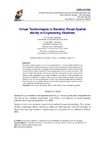Please use this identifier to cite or link to this item:
https://accedacris.ulpgc.es/jspui/handle/10553/36053
| Title: | Virtual technologies to develop visual-spatial ability in engineering students | Authors: | Roca-González, Cristina Martín Gutiérrez, Jorge García-Dominguez, Melchor Mato Carrodeguas, María del Carmen |
UNESCO Clasification: | 33 Ciencias tecnológicas | Keywords: | Virtual reality Augmented reality Spatial ability Virtual orienteering Gender |
Issue Date: | 2017 | Journal: | Eurasia Journal of Mathematics, Science and Technology Education | Abstract: | The present study assessed a short training experiment to improve spatial abilities using two tools based on virtual technologies: one focused on manipulation of specific geometric virtual pieces, and the other consisting of virtual orienteering game. The two tools can help improve spatial abilities required for many engineering problem-solving procedures. The results indicated that training activities improved the components of space ability (mental rotation, spatial visualization, and spatial orientation). In addition, it was concluded that there were no differences between men and women with respect to spatial ability levels before or after the training experiment. This fact resulted from masked training relating to daily living and leisure activities that are usually indistinctly performed by men and women in developed and industrialized countries. | URI: | https://accedacris.ulpgc.es/handle/10553/36053 | ISSN: | 1305-8215 | DOI: | 10.12973/eurasia.2017.00625a | Source: | Eurasia Journal of Mathematics, Science and Technology Education[ISSN 1305-8215],v. 13, p. 441-468 |
| Appears in Collections: | Artículos |
SCOPUSTM
Citations
69
checked on Jun 8, 2025
WEB OF SCIENCETM
Citations
50
checked on Mar 1, 2026
Page view(s) 1
651
checked on Jan 10, 2026
Download(s)
483
checked on Jan 10, 2026
Google ScholarTM
Check
Altmetric
Share
Export metadata
Items in accedaCRIS are protected by copyright, with all rights reserved, unless otherwise indicated.
